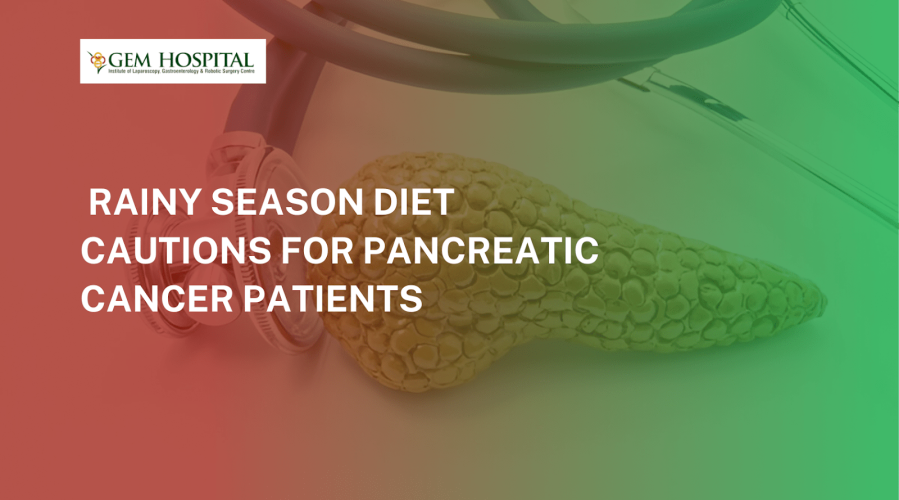Learn what gallstones are, their common symptoms, causes, and treatment options. Discover when to seek medical care and how to manage gallstone complications effectively.
Rainy Season Health Precautions for Chronic Conditions Like Hernia, Piles, and Pancreatic Cancer

The monsoon season brings much-needed relief from the scorching summer heat, but for individuals with chronic health conditions like hernia, piles, and pancreatic disorders, it can also bring a wave of discomfort and risk. Increased humidity, sudden temperature changes, and poor immunity during this period can aggravate existing conditions.
Whether you’re managing a hernia post-surgery, struggling with digestive sensitivity, or undergoing cancer care, it’s essential to adopt a proactive health routine that keeps you safe, comfortable, and stable throughout the rainy months.
1. Why the Monsoon Affects Chronic Conditions
The monsoon season affects our body in multiple ways:
- Low immunity: Viral and bacterial infections spread rapidly during the monsoon, which can slow healing and trigger inflammation.
- Digestive imbalance: The body’s metabolism slows down, increasing the chances of constipation, bloating, and indigestion — conditions that worsen both hernia and piles.
- Excess moisture: Fungal infections and skin rashes become common, especially around surgical scars or sensitive areas.
- Low physical activity: People tend to move less during rainy days, leading to weight gain and sluggish circulation, both of which are harmful to patients with chronic diseases.
2. Monsoon Precautions for Hernia Patients
If you’ve undergone hernia surgery or are managing a hernia conservatively, the monsoon requires extra care.
Diet Precautions
- Avoid heavy, oily foods — They slow digestion and cause bloating, putting pressure on the abdominal wall.
- Increase fibre intake — Include oats, whole grains, papaya, spinach, and apples to prevent constipation.
- Stay hydrated — Even if the weather feels cool, drink plenty of warm water to keep your digestive system active.
- Avoid street food — Contaminated food can trigger infections or vomiting, which may worsen hernia pain.
Lifestyle Care
- Don’t lift heavy objects — Sudden strain can increase abdominal pressure.
- Wear comfortable, breathable clothing — Prevents moisture accumulation around the surgical area.
- Practice gentle exercises — Light walking and breathing exercises improve circulation and core strength.
- Avoid coughing fits — Consult your doctor if you have seasonal allergies or a cold, as excessive coughing can trigger hernia discomfort.
3. Piles (Hemorrhoids) Care During Monsoon
Humidity and dietary changes often worsen piles symptoms, especially for those prone to constipation.
Smart Dietary Adjustments
- Eat high-fibre meals and avoid spicy or deep-fried food.
- Drink lukewarm water with lemon or cumin to aid digestion.
- Add buttermilk and probiotics to maintain gut health.
Hygiene & Routine
- Keep the anal region clean and dry to prevent fungal infections.
- Avoid sitting for long hours; take short walks to improve blood circulation.
- Use cushioned seats if you work long hours at a desk.
4. Pancreatic Health and Monsoon Nutrition
Patients with pancreatic disorders especially those undergoing chemotherapy or post-surgery need to focus on immunity and digestive comfort.
Safe Eating Practices
- Consume small, frequent meals instead of three large ones.
- Stick to low-fat diets — avoid fried snacks, pastries, and butter-rich foods.
- Include soups and steamed vegetables to make digestion easier.
- Drink boiled water and avoid raw salads or street juices.
Strengthen Immunity
- Include turmeric, ginger, and garlic in your meals for natural antibacterial benefits.
- Add vitamin-C-rich fruits like oranges, guava, and amla to boost resistance against infections.
- Avoid alcohol and smoking, as they reduce the pancreas’s ability to function properly.
5. Common Monsoon Mistakes That Can Worsen Symptoms
Many chronic patients unknowingly adopt habits that trigger discomfort:
- Ignoring mild abdominal pain or bloating, assuming it’s temporary.
- Skipping doctor follow-ups due to weather conditions.
- Consuming reheated or leftover food, which can harbor bacteria.
- Wearing tight synthetic clothing, which traps moisture.
- Sleeping immediately after eating, slowing digestion further.
These small missteps can worsen your condition or delay recovery, so awareness and discipline are key.
6. When to Seek Medical Help Immediately
If you experience any of the following during the monsoon, consult your doctor without delay:
- Sudden bulge or pain near the hernia site
- Persistent vomiting or indigestion
- Severe constipation or rectal bleeding (for piles patients)
- High fever, weakness, or loss of appetite (for pancreatic patients)
Delaying care during infection-prone months can lead to complications, so timely consultation is vital.
7. Rain-Ready Health Tips for All Chronic Patients
Here are some quick daily habits to stay safe this season:
- Drink only boiled or filtered water.
- Keep antibacterial wipes or tissues handy when travelling.
- Avoid damp footwear — they spread fungal infections quickly.
- Get enough sleep to support healing and immunity.
- Practice mindful eating — chew slowly and stop before you feel full.
The monsoon is not a season to fear — it’s a time to be careful and consistent. For patients with hernia, piles, or pancreatic diseases, following the right precautions can make all the difference between a healthy recovery and seasonal complications.
Listen to your body, maintain hygiene, eat light, and never ignore new symptoms. And remember, expert medical guidance ensures long-term relief and confidence in managing your condition.
For specialized gastro and surgical care, visit GEM Hospital — India’s trusted name for advanced laparoscopic and gastrointestinal treatment.
Book Appointment today to consult with experienced specialists and stay safe this monsoon!
Blogs & Article
Learn about bloating and gas problems, including common causes, symptoms, and effective solutions to improve digestion, reduce discomfort, and maintain gut health.
Learn how unverified Ayurveda treatments may cause liver damage, understand the risks, symptoms, and why medical guidance is essential for safe care.


